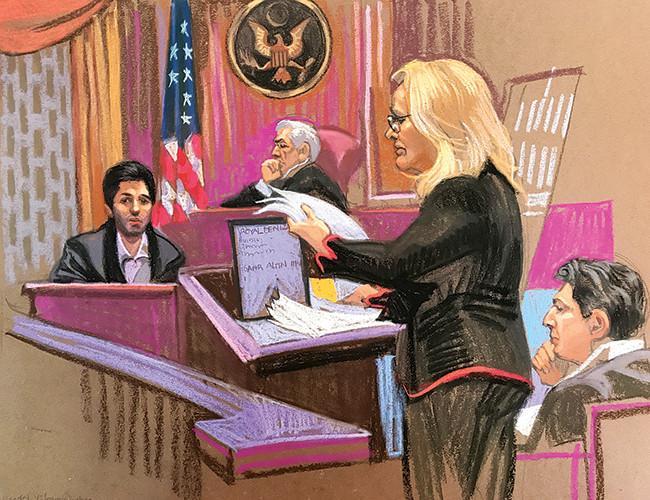Turkey warns US that sanction case witness is a fugitive from Turkey
SAMSUN/NEW YORK

Turkey has sent a letter warning the United States over a fugitive former police officer who testified during a trial into a former Turkish state bank executive in New York, saying the former officer is being sought over membership of the Fethullahist Terrorist Organization (FETÖ).
“We asked our U.S. addressee to end this unlawful practice immediately and to extradite the FETÖ terrorist organization member former police officer, for whom a warrant has been issued by Turkey’s judiciary,” Justice Minister Abdulhamit Gül told reporters in the Black Sea province of Samsun on Dec. 16, commenting on a letter he sent to his U.S. counterpart Jeff Sessions.
Hüseyin Korkmaz, a police officer sought in Turkey over being a follower of the U.S.-based Islamic preacher Fethullah Gülen, testified against former Halkbank deputy general manager Mehmet Hakan Atilla in the Iran sanctions case, prompting criticism from Ankara.
Gül has penned a letter to Sessions on the issue in which he asked for “an end to this unlawful practice.”
The minister also said Korkmaz had been determined to be a user of ByLock, a smartphone application used for communication by Gülenists, the group widely believed to have orchestrated the July 2016 coup attempt.
“The protection of a fugitive terror group member, who was determined to be using ByLock and who contributed to the illegal structuring of FETÖ, or putting him on a salary by public institutions and giving him monthly pay is never acceptable,” Gül said, referring to Korkmaz’s statements about receiving $50,000 of aid from the FBI and rental aid from the prosecutor’s office.
Warning that bilateral ties between Ankara and Washington could be harmed over the issue, Gül noted that “it is unacceptable for the U.S. to remain silent when a terrorist is creating disinformation against Turkey and carrying out a campaign against the country.”
Ankara’s demand from Washington to extradite Korkmaz came after Atilla took the witness stand in a New York courtroom on Dec. 15 and denied charges that he participated in a scheme to help Iran evade U.S. sanctions.
Atilla, who has been on trial in federal court for three weeks, told jurors that he “never” conspired with fellow defendant, Turkish-Iranian businessman Reza Zarrab, as U.S. prosecutors have charged. Zarrab pleaded guilty and testified for the prosecution.
U.S. prosecutors have charged nine people with conspiring to help Iran evade sanctions through fraudulent gold and food transactions. Only Zarrab, 34, and Atilla, 47, have been arrested by U.S. authorities.
Zarrab’s name was involved in Turkey’s Dec. 17-25, 2013 corruption probes, which also embroiled four former ministers and other state officials. Zarrab was accused of paying bribes to senior government figures, but eventually the charges were quashed by the government, which said the probe was masterminded by Gülenists.
Zarrab was arrested in the U.S. last year but as he became the prosecution’s top witness in the trial, Atilla is now the sole man in the dock accused of violating sanctions, bribery and money laundering.
Halkbank has said all of its transactions complied with national and international regulations.
Responding to questions in court from one of his lawyers, Cathy Fleming, Atilla directly contradicted some of the evidence presented during the trial.
“Mr. Atilla, did you ever take a bribe from Reza Zarrab?” Fleming asked, referencing Zarrab.
“Never,” Atilla responded.
Zarrab had told the jury that he had seen Atilla’s superior call Atilla on an afternoon in April 2013 and order him to authorize an illicit transaction. Atilla testified that he was on a plane at the time.
Atilla also said that a recorded phone call played in court, purportedly between him and Zarrab, was actually between Zarrab and another Halkbank employee.
Earlier last week, Atilla’s lawyers asked U.S. District Judge Richard Berman in Manhattan to order a mistrial following the testimony of Korkmaz, who said he had investigated Zarrab and Turkish government officials years earlier.
The judge, without the jury present, denied the request for a mistrial on Dec. 15. He said Korkmaz had actually helped Atilla by testifying that Atilla was never caught on surveillance videos or found to take bribes in the investigation.
The judge criticized the cross-examination of Korkmaz by Todd Harrison, one of Atilla’s lawyers. Harrison on Dec. 14 asked about possible links between Korkmaz and Gülenists.
Berman said it was “unpersuasive and borderline unprofessional” to bring up what he called an “illogical foreign conspiracy theory” in court.
Harrison said he disagreed with Berman’s criticism. “I think it was a legitimate cross-examination,” he said.
















